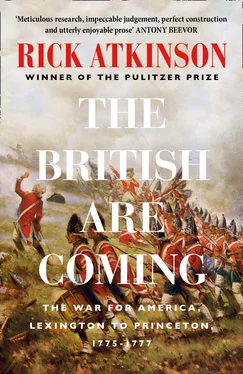“A general popping from them ensued,” Captain Laurie later told General Gage. One of his lieutenants had reloaded when a bullet slammed into his chest, spinning him around. Three other lieutenants were wounded in quick succession, making casualties of half the British officers at the bridge and ending Laurie’s fragile control over his detachment. Redcoats began leaking to the rear, and soon all three companies broke toward Concord, abandoning some of their wounded. “We was obliged to give way,” an ensign acknowledged, “then run with the greatest precipitance.” Amos Barrett reported that the British were “running and hobbling about, looking back to see if we was after them.”
Battle smoke draped the river. Three minutes of gunplay had cost five American casualties, including two dead. For the British, eight were wounded and two killed, but another badly hurt soldier, trying to regain his feet, was mortally insulted by minuteman Ammi White, who crushed his skull with a hatchet.
A peculiar quiet descended over what the poet James Russell Lowell would call “that era-parting bridge,” across which the old world passed into the new. Some militiamen began to pursue the fleeing British into Concord, but then veered from the road to shelter behind a stone wall. Most wandered back toward Punkatasset Hill, bearing the corpses of Davis and Abner Hosmer. “After the fire,” a private recalled, “everyone appeared to be his own commander.”
Colonel Smith had started toward the river with grenadier reinforcements, then thought better of it and trooped back into Concord. The four companies previously sent with Captain Parsons to Barrett’s farm now trotted unhindered across the bridge, only to find the dying comrade mutilated by White’s ax, his brains uncapped. The atrocity grew in the retelling: soon enraged British soldiers claimed that he and others had been scalped, their noses and ears sliced off, their eyes gouged out.
As Noah Parkhurst from Lincoln observed moments after the shooting stopped, “Now the war has begun and no one knows when it will end.”
No fifes and drums would play the British back to Boston. From his command post in Wright Tavern, Smith, described by one of his lieutenants as “a very fat heavy man,” moved with unwonted agility in organizing the retreat. Badly wounded privates would be left to rebel mercy, but horse-drawn chaises for injured officers were wheeled out from Concord’s barns and stables. Troops filled their canteens, companies again arranged themselves in march order, and a final round of food and brandy was tossed back. Before noon the red procession headed east, silent and somber, every man aware that eighteen miles of danger lay ahead.
The first mile proved almost tranquil. The road here was wide enough—four rods, or sixty-six feet—for the troops to march eight abreast, in a column stretching three hundred yards or more. Using tactics honed during years of combat in North American woodlands, scores of light infantry flankers swept through the tilled fields and apple orchards, stumbling over frost-heaved rocks while searching for rebel ambushers. “The country was an amazing strong one, full of hills, woods, stone walls, &c.,” Lieutenant Barker of the King’s Own would tell his diary. “They were so concealed there was hardly any seeing them.”
But the rebels were there. Arrowhead Ridge loomed above the north side of the road, offering a sheltered corridor through the Great Fields for hundreds of militiamen hurrying from North Bridge to Meriam’s Corner. Here the road narrowed to a causeway across boggy ground, canalizing and slowing the column. Skirmishers in slouch hats could be seen loping behind outbuildings and across the pastures and meadows. British soldiers wheeled and fired, but again threw their shot high. “This ineffectual fire gave the rebels more confidence,” one officer observed. A return volley killed two redcoats and wounded several more. Some officers dismounted to be less conspicuous; the morning had demonstrated how American marksmen—“with the most unmanly barbarity,” a redcoat complained—already had begun targeting those with shiny gorgets at their necks and the bright vermilion coats commonly worn by the higher ranks.
Now the running gun battle began in earnest, with crackling musketry and spurts of smoke and flame. The provincial ranks swelled to a thousand, twelve hundred, fifteen hundred, more by the hour—“monstrous numerous,” a British soldier would write to his mother. The road—Battle Road, as it would be remembered—angled past Joshua Brooks’s tannery; the smell of tannins rose from the pits, drying racks, and currier shop, and a sharper odor wafted from the nearby slaughterhouse that sluiced offal into Elm Brook. Just to the east, past where the wetlands had been ditched and drained to create a hay meadow, the road began to climb through a cut made in the brow of a wooded hill, then nearly doubled back on itself in a hairpin loop soon known as the Bloody Curve. Here was “a young growth of wood well-filled with Americans,” a minuteman wrote. “The enemy was now completely between two fires.”
Plunging fire gashed the column; grazing fire raked it. Men primed, loaded, and shot as fast as their fumbling hands allowed. A great nimbus of smoke rolled across the crest of the hill. Bullets nickered and pinged, and some hit flesh with the dull thump of a club beating a heavy rug. Militiamen darted from behind stone walls to snatch muskets and cartridge boxes from eight dead redcoats and several wounded who lay writhing in the Bloody Curve. One regular later acknowledged in a letter home that the rebels “fought like bears.” An American private reported seeing a wounded grenadier stabbed repeatedly by passing militiamen so that “blood was flowing from many holes in his waistcoat.” He later reflected, “Our men seemed maddened with the sight of British blood, and infuriated to wreak vengeance on the wounded and helpless.”
More vengeance lurked a mile and a half ahead. Captain John Parker’s company had suffered seventeen casualties in Lexington eight hours earlier, but Parker and his men—perhaps a hundred or more—were keen to fight again. Two miles west of the Common, they dispersed above a granite outcrop in a five-acre woodlot thick with hardwood—hickory, beech, chestnut, red and white oak—and huckleberry bushes. Battle noise drifted from the west, and around two p.m. the thin red line came into view six hundred yards down Battle Road, moving briskly despite more than sixty wounded, not to mention the two dozen dead already left behind. A small bridge at a sharp bend in the road again constricted the column, and as the British vanguard approached within forty yards, the rebels fired. Bullets struck Colonel Smith in the thigh and Captain Parsons in the arm. Major Pitcairn galloped forward to take command as redcoats sprayed the woodlot with lead slugs. When enemy soldiers began to bound up both flanks, Parker and his men turned and scampered through the trees, drifting toward Lexington to join other lurking ambuscades.
The “plaguey fire,” as one British captain called it, now threatened the column with annihilation. “I had my hat shot off my head three times,” a soldier later reported. “Two balls went through my coat, and carried away my bayonet from my side.” Gunfire seemed to swarm from all compass points at Bloody Bluff and, five hundred yards farther on, at Fiske Hill. Pitcairn’s horse threw him to the ground, then cleared a wall and fled into the rebel lines. The major wrapped up his injured arm and pressed on. Ensign Jeremy Lister was shot through the right elbow; a surgeon’s mate extracted the ball from under his skin, but a half dozen bone fragments would later be removed, some the size of hazelnuts.
The combat grew even more ferocious and intimate at Ebenezer Fiske’s house, still thirteen miles from Boston Harbor. James Hayward, a twenty-five-year-old teacher, had left his father’s farm in Acton that morning with a pound of powder and forty balls. At Fiske’s well, he abruptly encountered a British soldier. Both fired. The redcoat died on the spot; Hayward would linger for eight hours before passing, shards of powder horn driven into his hip by the enemy bullet. Several wounded British soldiers were left by their comrades in the Fiske parlor, and there they died.
Читать дальше












